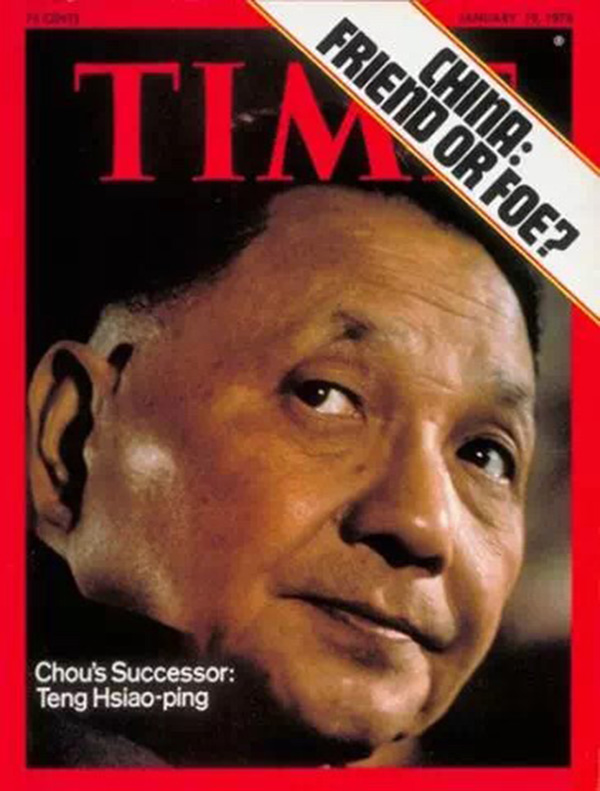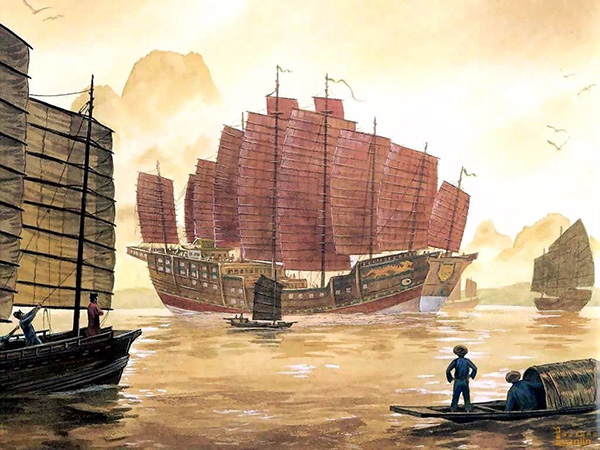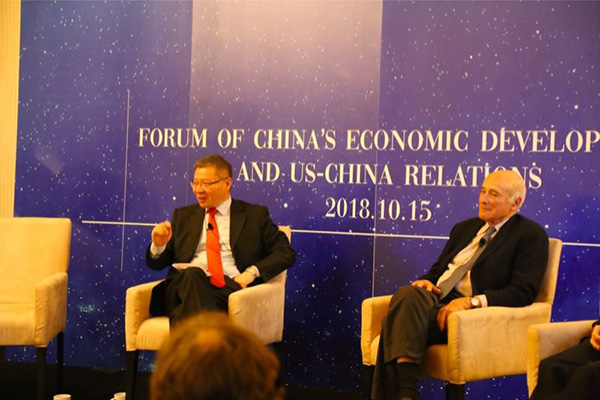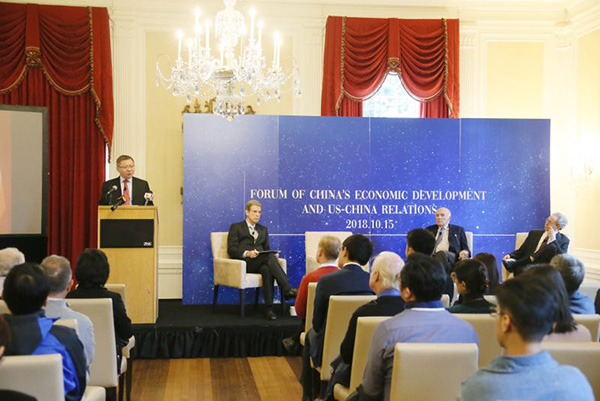On the afternoon of October 15th, local time, the forum "China’s Economic Development and Sino-US Relations" was held in Harvard University. This forum is sponsored by the Shanghai Municipal Government Information Office and China Research Institute of Fudan University, and supported by Kennedy School of Harvard University. Joseph Nye, former Dean of Kennedy School of Harvard University, Zhang Weiwei, Dean of China Research Institute of Fudan University, Robert Kuhn, a famous expert on China, and Sir William Geoffrey Ehrman, a professor at Harvard University delivered keynote speeches at the forum. This article is a speech by Professor Zhang Weiwei.

Professor Zhang Weiwei gave a speech at Harvard University.[It is impossible to win a trade friction with the world’s largest consumer market]
I am very glad to hold such an international forum at this critical moment in the development of Sino-US relations. Thank you for your distinguished guests and well-known scholars. Your arrival has made this forum full of splendor.
More than 40 years ago, in January, 1976, Time Magazine first published China leader Deng Xiaoping as a cover figure, and at the same time asked a question in large font beside his image: "China: Friend or Enemy?" (China: Friend or Foe? This shows that the United States at that time, after the death of Premier Zhou Enlai and when President Mao Zedong was seriously ill, was full of uncertainty about how Sino-US relations would evolve. But more than 40 years later, many Americans still seem to ask this question today: "China: Friend or Enemy?"

Forty years later, many Americans are still asking this question: "China: Friend or Enemy". Recently, many American friends and American experts in China are saying that the mainstream of American society is becoming more and more negative and even hostile to China, and many people who are usually friendly to China are afraid to speak out. The recent speech by Mr. Burns, the vice president of the United States, gives people the impression that China is already an "enemy", even a terrible enemy. He thinks that China is interfering in the internal affairs of the United States and even "wants to change the president of the United States". In fact, this is the idea of many Americans, especially many Harvard people. (Laughter)
Personally, I hope these are all "fake news". After all, in the past 40 years, various exchanges between China and the United States have increased hundreds of times: taking the trade between the two sides as an example, the trade volume between China and the United States in 2017 was 233 times that of 1979. The exchange of personnel between the two sides has also grown from scratch. Today, 14,000 people travel between China and the United States every day, and a plane flies to the other country every 17 minutes. Of course, due to the unwise Sino-US trade friction initiated by President Trump, the number of China visitors to the United States dropped by more than 40% during the National Day Golden Week in China.
I want to add here. China’s domestic consumption this year is nearly 6 trillion US dollars, which is calculated according to the official exchange rate of US dollars. If calculated according to purchasing power parity, the consumer market is bigger. In other words, China is already the largest consumer market in the world. Trade friction with the world’s largest consumer market is impossible to win.
I also know that some people are still cautiously optimistic about Sino-US relations, and there are more and more people in American society, especially young people, who care about China. In many states and cities that have frequent exchanges with China, people from officials to business circles are very friendly to China. The latest survey of American Chamber of Commerce in China also shows that despite the Sino-US trade war provoked by President Trump, most American enterprises in China continue to be optimistic about China, and one third of them plan to further increase their investment in China.
Which view is the mainstream, we can observe it for a while. Even if the pessimistic view is in the mainstream for the time being, we don’t need to be overly pessimistic. After all, there is a philosophical saying in English: Things may have to get worse before they get better. China people also have a similar expression, which is called "Good things grind more". This is in line with the dialectics of the development of things. Only by constantly overcoming problems and contradictions can we achieve mutual understanding and win-win cooperation. This also makes our communication at Harvard University particularly meaningful.
We need to face up to problems and communicate frankly. Only in this way can we help to dispel the dark clouds over Sino-US relations as soon as possible and put our bilateral relations on the road of relatively healthy development. Therefore, I will put forward my views frankly and be willing to answer any questions you have. I emphasize "any question" and there is no taboo.
[The thinking logic behind the three cognitive misunderstandings of China in the United States is that you lose and I win, and zero-sum game]
I want to talk about three misunderstandings about China in the United States:
One of the cognitive misunderstandings: the so-called "Thucydides Trap", that is, the conflict and even the war between a big and emerging country is inevitable.
The second cognitive misunderstanding: China wants to sell the China model to the world.
The third cognitive misunderstanding: China pursues expansionism.
Limited by time, I am not going to discuss every misunderstanding in detail, but I hope to reveal the cultural logic behind these misunderstandings, so as to deconstruct them in a wider scope.
Let’s go back to the question of "China, friend or enemy". With all due respect, there is a typical western or American thinking logic behind this problem. The biggest characteristics of this logic are black and white, either/or, you win or lose, and zero-sum game.
Similarly, former US President George Bush said, "With us or against us"; There is also the assumption of the trade dispute between President Trump and China: China’s trade surplus means that China has benefited and the United States has suffered greatly.
In my personal opinion, two Harvard professors who are far wiser than these two politicians don’t seem to have got rid of the same logic. I mean Professor Samuel Huntington, who put forward the "Clash of Civilizations" many years ago, and Professor Graham Ellison, who put forward the "Thucydides Trap", although Professor Ellison’s original intention was to avoid the conflict between China and the United States. I think the logic behind these two views is still a zero-sum game. You win and I lose, but the rise of one party must be at the expense of the decline of the other.
China has an ancient civilization with uninterrupted history, and our political and cultural traditions seem to be more tolerant and calm than those in Europe. We have always believed that each inch has its own strengths, while each inch has its own shortcomings. Different civilizations and nationalities can learn from each other, learn from each other’s strengths, and finally achieve a win-win situation.
If we ask questions from the perspective of China’s political culture, we may not ask "Is this country a friend or an enemy" but "Is this country a friend or potential friend? )”。
In other words, in China’s political culture, especially in the political tradition of dealing with state-to-state relations, all countries are friends now or in the future. We do not draw a line by ideology or political system. Even though the relationship between a certain country and China is difficult for various reasons, we firmly believe that we can finally create conditions to turn our enemies into friends. In my opinion, the biggest feature of China’s foreign policy today is to deal with all countries and strive to become friends and partners with all countries.
Through the literal differences between "friends or enemies" and "friends or going to be friends", we can see the differences between Chinese and western political and cultural traditions, especially religious traditions.
There have been thousands of years of religious wars in European history, and countless wars have been fought between different religions and different sects within the same religion. In contrast, there are various wars in China’s history, but there are few religious wars. To a great extent, I personally think that this huge difference is related to the monotheistic tradition in the West. The monotheistic tradition often means: you have different beliefs from mine, you are a heretic, I am right, you are wrong and even evil, and I must make you like me, otherwise you are my enemy.
In contrast, China’s religious tradition is inclusive and comprehensive in nature, so in the history of China, Confucianism, Buddhism and Taoism blended and complemented each other, which enabled China to successfully avoid the suffering of a long-term religious war, which is probably one of the main reasons why China’s civilization lasted for thousands of years without interruption.
In those days, Voltaire, Leibniz, Spinoza and other European enlightenment thinkers highly admired and praised China’s tradition, which they called "natural religion", that is, the great tradition of being close to nature, non-political and non-zero-sum game.
Of course, another feature of China’s religious tradition is that religion is not allowed to interfere in politics, so China has a long tradition of separation of church and state, which we are proud of.
Because of this, if we look at the so-called "Thucydides Trap" from the Chinese perspective, we will find that the 16 cases cited by Professor Ellison are almost all countries that believe in either-or, zero-sum games in western political culture. It is unconvincing to compare this situation with China, a country that doesn’t believe in zero-sum games. In other words, "Thucydides Trap" (one of the cognitive misunderstandings) obviously does not apply to China.
Similarly, there is no missionary tradition in China. China never wanted to change other people’s beliefs or impose his own model on others. If many developing countries look to the China model today, it is largely because they have tried the western model and failed, even a very painful failure, so they want to get inspiration from China’s experience. This is an exchange of development experience, which is beneficial to developing countries, western countries including the United States and the whole human society. In short, the cognition that China wants to sell his own model (the second cognitive misunderstanding) is also difficult to establish.
I would also like to point out that in Professor Ellison’s 16 cases, all the countries that started wars were superstitious about military conquest. This is also a major difference between Chinese and western political history.
Empires in European history are basically military empires, and conquering other countries by force is part of their belief. The rise of the European Empire has always been accompanied by colonial wars, and it was only after two world wars that it learned from a painful experience and embarked on the road of peaceful integration.
China has no tradition of western militarism. When Zheng He went to the Western Ocean in the first half of the 15th century, the displacement of his capital ship was 100 times that of the Santa Maria in discovery of america, Columbus some 80 years later, but China did not colonize other countries. China is a nation that built the Great Wall, which is a defense system, not an attack system.

Around 1890, when the United States became the largest economy in the world, it launched the Spanish-American War and occupied Spanish colonies such as the Philippines and Cuba. In contrast, China became the world’s largest economy in 2014 at purchasing power parity. With China’s military strength today, China may be able to recover all the south island reefs occupied by neighboring countries within 24 hours, but China has not done so, but advocates resolving differences through negotiations.
We can also trace back to 1964, when we first started to possess nuclear weapons, when China announced that it would not be the first to use nuclear weapons and would not use nuclear weapons against non-nuclear countries. If all nuclear-weapon States can do this today, our world can be free from the fear of nuclear war today.
It is obviously absurd for American media to describe such China as bellicose. It was only from the repeated western invasions in China’s modern history that he realized that without strong national defense, he would be trampled upon, so he began to pursue the goal of national rejuvenation and strong national defense, and achieved great success. Today, China people have great confidence in their national defense capability, and China will not accept any country’s challenge to China’s core interests. In a word, China’s view of pursuing expansionism (the third cognitive misunderstanding) is obviously untenable.
This reminds me of the British philosopher Russell’s visit to China about a century ago. At that time, the western world had just experienced the painful First World War. He deeply reflected on the tradition of advocating violence in western culture and highly praised China’s tradition of advocating peace. However, at that time, many intellectuals in China lost their necessary cultural confidence because their country was defeated by western powers again and again. Russell farsightedly pointed out that one day, when the Chinese people have enough self-defense ability, China people’s culture of advocating peace will benefit the whole world.
Personally, I think this is largely the situation in China today. Through decades of unremitting struggle, China has developed economically and gained sufficient self-defense capability, but China does not invade other countries, and certainly does not allow other countries to invade China. On this basis, we promote peace and development around the world, including the "One Belt, One Road" initiative to jointly build and share. We advocate the establishment of a new type of relationship between major powers and jointly build a community of human destiny.
It is better to make a wise choice of win-win cooperation than to make a stupid choice of cold war.
We are at a critical moment in historical development, and our choice will become very important. We see that there is a force in the United States that wants to pull Sino-US relations into the Cold War. This is not in the interest of the United States, nor is it in the interest of China and the whole world. I remember Professor Joseph Nye once said when discussing soft power, declare China as the enemy, and China may become your enemy. This possibility does exist, but we don’t want it to happen. We are gathered at Harvard University today to avoid it.

The key for Professor Zhang Weiwei and Professor joseph nye to answer questions from the audience is to make a wise and win-win cooperation choice instead of making a stupid cold war choice, so that China and the United States can get rid of the shadow as soon as possible and embark on the road of win-win cooperation. The interests of China and the United States, the two largest economies in the world, have been closely tied together, and seeking common ground while reserving differences and win-win cooperation are the only correct choice.
China has no difficulty in this choice, because there are genes in our culture that are harmonious but different and win-win cooperation. In fact, in the process of its own rise, the United States has also demonstrated such an inclusive culture. Franklin, one of the founding fathers of the United States, studied the works of Confucianism in China very seriously. He believed that human beings "need to reach the perfect acme of wisdom through Confucius’ moral philosophy" (Confucius’ moral philosophy was “the gate through which it is necessary to pass to arrive at the sublimest wisdom ”)。 Thomas Jefferson, John Adams, Thomas Payne and other American founders all drew a lot of wisdom from Confucianism.
Similarly, China has also learned a lot of knowledge and wisdom from the United States in the process of its rise. We have been learning from the United States, and we are still learning from the United States, and we will learn from the United States in the future. But this is not copying the American model, copying other people’s models will never succeed, and American friends present here will agree that there are many problems in the American model itself.
In this sense, our vision is beyond the American model. We have carried out the largest reform and exploration in the history of mankind on the land of China, and there are many successful experiences in this process, many of which, in my opinion, are worth studying and even learning from American friends, especially the experience of harmony without difference and win-win cooperation.
We hope that the United States can understand China objectively and realistically. We are not begging the United States to do so, and we will never beg the United States to do so, but believe that it is in the interests of the United States. I once told reporters in The New York Times that if we earnestly explain China to you again and again, and you still don’t want to understand China objectively, then we really have no choice. We don’t really care. We will let you continue to wander in the dark, and you will regret it in the end, not us.
World history has entered a critical moment. We should prevent any efforts to push Sino-US relations to the cold war. The Cold War was based on a balance of terror, the so-called MAD (mutually assured destruction). This choice will have extremely serious consequences for both sides and the world, even what Mr. Russell called "madness."
Today, we can choose MAP (mutually assured prosperity) which is 100 times better than MAD. This choice will bring more peace and prosperity to the Chinese and American people and the whole world. If we can take a more courageous step forward and work together to build a community of human destiny, then the relationship between our two countries will develop better and smoother.
Finally, thank you again for this opportunity, so that I can directly introduce China’s cultural traditions and discuss Sino-US relations in the forum of Harvard University, and at the same time, I also put forward my frank views on the expositions of three Harvard professors with global influence. I also hope that my speech today will not be interpreted as "interfering in the internal affairs of the United States." Thank you! (The audience laughs and applauds warmly)

关于作者